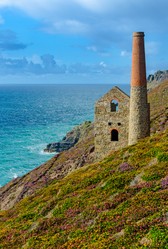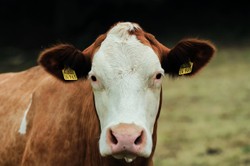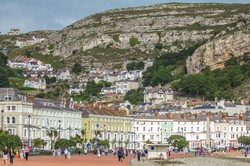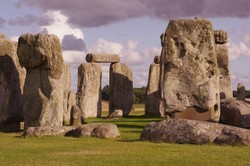Rising Ground originates in the author's desire to explore the distinction between space and place, and to realize that while the lived landscape can be represented on maps,its character is not fully or adequately reflected in any map or merely Geographical account. To read a map is to see structure in the abstract, a representation of location in space; but to see the land as a place is to see it holistically as a place with meaning, which has a history that leaves its prints within it and shapes its character. So this book is about the genius loci,the spirit of the place, and the author's attempt to explore it through his experience of Cornwall.
Cornwall has many admirers for its rugged land and seascapes, for its granite cliffs and waves thundering against its rocky shores. Many enjoy its bleak, but often dangerous moorlands, such as Bodmin Moor, and its rivers full of character. Yet they also enjoy Cornwall as a place with a history, not always a peaceful one. Those with an archaeological bent relish its ancient megalithic sites; lovers of myth cherish its supposed Arthurian connections and the druids; and there are Cornish characters whose lives are worthy of the attention of biographers. Marsden has attempted to do some justice to all of these aspects of England's characterful south westernmost county.
The author has the advantage of having moved there to dwell in a remote cottage in the Roseland peninsula bordering the estuary of the River Fal, which flows steeply down from the bleak fastness of Bodmin Moor to meet the sea in a broad and navigable estuary. He tells of how he purchased a cottage at Ardevora [pronounced Ardevra] , a name that in Cornish means by the water. Here is one great point about this book, the way in which he uses his linguistic scholarship to reveal the origins of Cornish place names.Every chapter about a place explains the origins of its name in Cornish. I found this a delightful characteristic of this book.
The writer gives an account of what it is like to fall in love with an old cottage and refurbish it. He does so in a manner that brings out the difficulties faced by anyone who undertakes this arduous labour of love, but he does not overdo it. This is a delicate balancing act that the author gets right.This never becomes a book about house restoration.







 Darkness over the Earth the skies darkened when Jesus was crucified14 days ago
Darkness over the Earth the skies darkened when Jesus was crucified14 days ago
 TheThousand Year Gardenon 11/26/2025
TheThousand Year Gardenon 11/26/2025
 Women of the Gospelson 10/11/2025
Women of the Gospelson 10/11/2025
 Religious Gardenson 08/25/2025
Religious Gardenson 08/25/2025




Comments
Yes there are.
Thank you for your comment below in answer to my previous observation and question.
Cornish-language revival intrigues me.
Might there have been dictionaries, glossaries, spelling lists, translations, vocabulary sheets to make sure of mustering correct meanings to Cornish words?
Maybe some words were preserved in dialect, but I know not of any, but there were a small number of literary texts that preserved some Cornish language.
Thank you for your comment below in answer to my previous observation and question.
Cornish not vocalized intrigues me.
Might Cornish sounds have been preserved in nursery and religious songs and in popular ditties?
Otherwise, how were any reintroduction efforts able to reinstate intonation and pronunciation?
Therebwere probably some who understoodvit after 1870, but no one is known to have used it.
Thank you for your comment below in answer to my previous observation and question.
Cornish expiring as a spoken language in the late 19th century intrigues me.
Is it true that Cornish stopped being spoken in the 1870s at all or were there Cornish speakers who were so dispersed that in essence they would have had no one nearby to speak the language with?
While Cornish died in the 1870s as a spoken language, the Cornish have always been proud of their distinct Celtic culture and do not regard themselves as English. They are in England, but not English. They have just successfully won the accolade of Britain's fourth nation along with the English,Scots and Welsh.
frankbeswick, Thank you for the immersion: travelogues are such entertaining education.
It almost seems that Cornwall may have been more of a space than a place when the last native Cornish speaker died and more of a place than a space when the language began to revive.
Cornish is an interesting language. It is Celtic, like Welsh and Irish, but related in different ways to both. For example, the Welsh word for "the" is y or yr,pronounced urr and the Irish is "an". Cornish, while considered a language closer to Welsh than to Irish [in that Welsh and Cornish are P Celtic rather than Q Celtic, which Irish is] uses "an" but there has been little historic connection between Cornwall and Ireland, except for times recounted in the myth of Tristan and Yseult, when Cornishmen and raiding Irishmen spent much time slaughtering each other. Cornish possessive adjectives are close to the Irish prepositional pronouns. The connection indicates ancient roots to both tongues.
To think of the Saxons as one people is to understate the complexity of history. Angles and Jutes spoke a dialect different from the Saxons and saw themselves as different peoples. There were other German tribes who entered England, Allemani and Friesians along with others also came in the great Germanic migration [not invasion] into Britain. They intermarried with the Celtic Britons. It is not widely known that in certain parts of the country we can find evidence of Saxon Y chromosomes but little genetic evidence of Saxon women. It appears that the Romans used to recruit troops in one country and move them to another,so much of the Saxon input into England's genes came from Saxon males marrying British females.
You read some interesting books. I am aware of different people moving into different parts of England. And yes, the Saxons were one such people. I find this diversity interesting, but not unexpected. People in this part of the world have their own language quirks as well.